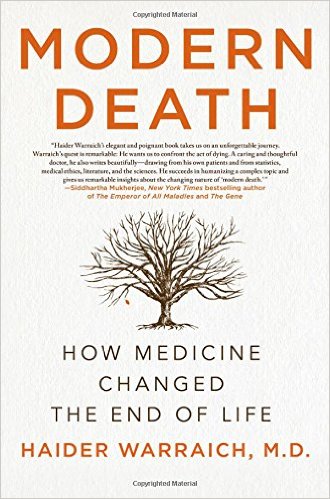We crossed oceans, traversed the skies, and journeyed to the moon. What hasn’t changed is the finality of finite human life and the pace of time. But Dr. Haider Warraich says, that Whys, Whens, Wheres, and Hows have surely changed from how humans perceived and responded to death, compared to our ancestors. In Modern Death, he takes a look at how these changing parameters have transformed the perception of this final event.
Dr Warraich is currently training in cardiology at Duke University Medical Center, Durham NC. Before this, he was a staff physician at the Beth Israel Deaconess Medical Center and instructor at Harvard Medical School, where he also received my training in internal medicine. His writing has been widely featured in the media and he has made appearances on CNN, PBS and FOX as well as BBC Radio and NPR to discuss them.
Modern Death: How Medicine Changed the End of Life
Author: Haider Warraich
Hardcover: 336 pages
Publisher: St. Martin’s Press (February 7, 2017)
ISBN: 1250104580, 978-1250104588
Modern Death Summary
The author opens dutifully by explaining what really happens as we near dear death. What death means at the cellular level and why death of cells is necessary for our own good. Death used to be sudden and swift, centuries ago. Now, we have longer life spans, where many hop to their death haltingly, spending more time in hospitals than at their homes. We – family, doctors, hospitals – do everything in our power to prolong this struggle. He does point out that the development has ensured that people don’t die of infections that frequently. However, diseases like Cancer and lifestyle disorders have become more common killers.
From his experiences with his patients, interviews with Nobel Laureates, and people of death bed, the authors has compiled a narrative that bring out the discussion about death in the open, similar to one by Atul Gawande in Being Mortal.
Modern Death then goes into some of the most important, yet muddled topics. He talks about the legal definition of death and differences between Euthanasia, and pulling the life support system. That we do not allow our patients to opt whether they want to die, but allow their guardians to make that decision (pull the life support system) seems odd, at the least.
Above all, he urges all to talk more about this finality that no human can escape. Our fear of death keeps us from talking about many things. When we refuse to talk about death with our doctors and our family we refuse to have a closure. And then there looms a prospect of slow and painful death that comes a the most inopportune time and leaves many things unsaid. Talk about Death is the call Haider Warraich makes in Modern Death. And find ways to make it better, not worse for those in their final moments.
Modern Death Reviews
“Warraich concludes this sensitive review of a painful subject with guarded optimism that a cultural shift toward open discussion is now occurring.” Kirkus Reviews
“Warraich eloquently explores the act of dying, he urges the public to talk more about it” ~ Publisher’s Weekly
“If Modern Death occasionally uses a few more words than necessary, the inclusion of Warraich’s anecdotal experiences enliven what could have been a dry academic text.” ~ Pages of Julia
Additional Reading
The Rituals of Modern Death by Haider javed Warraich.
Interview with Haider Warraich
